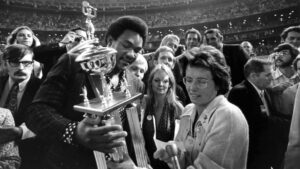Next year, the Australian Open plans to extend its schedule by one day in order to ease the strain on players and fans. This decision comes after several grueling matches in past years that lasted until the early hours of the morning.
The schedule for the January grand slam in Melbourne has been changed to 15 days, following increasing demands to reduce finish times due to a jam-packed schedule and many matches running late into the night, causing exhaustion for players.
During the current tournament, Andy Murray and Thanasi Kokkinakis made headlines after their grueling match ended at 4:05 a.m. The second-round game lasted for almost six hours.
Murray, a former top-ranked player and winner of three grand slam tournaments, expressed frustration not only with the length of the game but also with being unable to take a bathroom break during the match.
During the initial rounds of the tournament, the Australian Open has a rigorous schedule where five matches are typically played on the show courts per day – three in the daytime and two in the evening.
“We have taken into account the input from players and fans and are thrilled to announce a solution that will reduce the number of late finishes, while still maintaining a fair and balanced schedule on the stadium courts,” stated Craig Tiley, tournament director of the Australian Open.

The first round of the tournament will now span three days instead of the previous two, allowing for a smoother start during the busy initial stages.
The 2024 Australian Open will now take place from January 14-28, with a Sunday start and an increase in the number of sessions from 47 to 52 across three arenas. However, the organizers have not specified if there will be a designated time for night matches.
The battle between Murray and Kokkinakis was only the second-latest finish in the tournament’s history.
In 2008, Lleyton Hewitt defeated Marcos Baghdatis in a five-set match at 4:33 a.m. after Roger Federer’s four and a half hour win over Janko Tipsarevic earlier in the day.
The late endings are an added perk for European and North American viewers, as they can watch the excitement and intensity of a five-set game during their daytime. However, they are not as enjoyable for the players and spectators at the venue.
In tennis, there is no time limit, so matches can continue until a player wins.
Currently, three of the four major tennis tournaments (the Australian Open, the French Open, and the US Open) have night sessions, while Wimbledon ends its evening sessions at 11 p.m. and continues unfinished matches the next day.
The curfew at Wimbledon, which was put into effect in 2009, was designed to ensure that spectators could safely return home from the event. However, on certain occasions, this cutoff has caused fans to anxiously await the outcome of intense matches.
In 2010, at Wimbledon, American player John Isner won against French opponent Nicolas Mahut after an intense 11-hour match that spanned three days.
Reporting for CNN was provided by George Ramsay.
Source: cnn.com



















